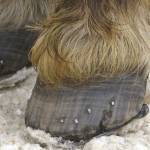Scientist Honored for Laminitis Research

At the European Workshop on Equine Nutrition, Catherine Hale was named Young Scientist of the Year for her doctoral project, a study of forage digestibility in horses. Hale presented data suggesting that horses with a history of diet-induced laminitis seem to have compromised fiber fermentation in the hindgut. Because forage can supply up to 70% of the energy required by active horses, individuals that don’t process forage efficiently could end up with health or performance problems.
Laminitis, a painful inflammation of the laminae within a horse’s hoof, can be triggered by overfeeding grain or other high-starch feed components. Starch that is not digested in the small intestine enters the hindgut, where it is rapidly fermented. The byproducts of this rapid fermentation set off a chain of results that can lead to colic, hindgut acidosis, and laminitis in some horses.
Hale compared the different bacterial profiles taken from normal healthy horses and horses that had a history of laminitis. She found that starch fermentation took place significantly faster in horses with a history of laminitis, possibly producing lactic acid more quickly and in larger quantities than normal horses would. These horses also fermented hay significantly less efficiently than normal horses, showing that they might be unable to utilize forage as well as other horses.








